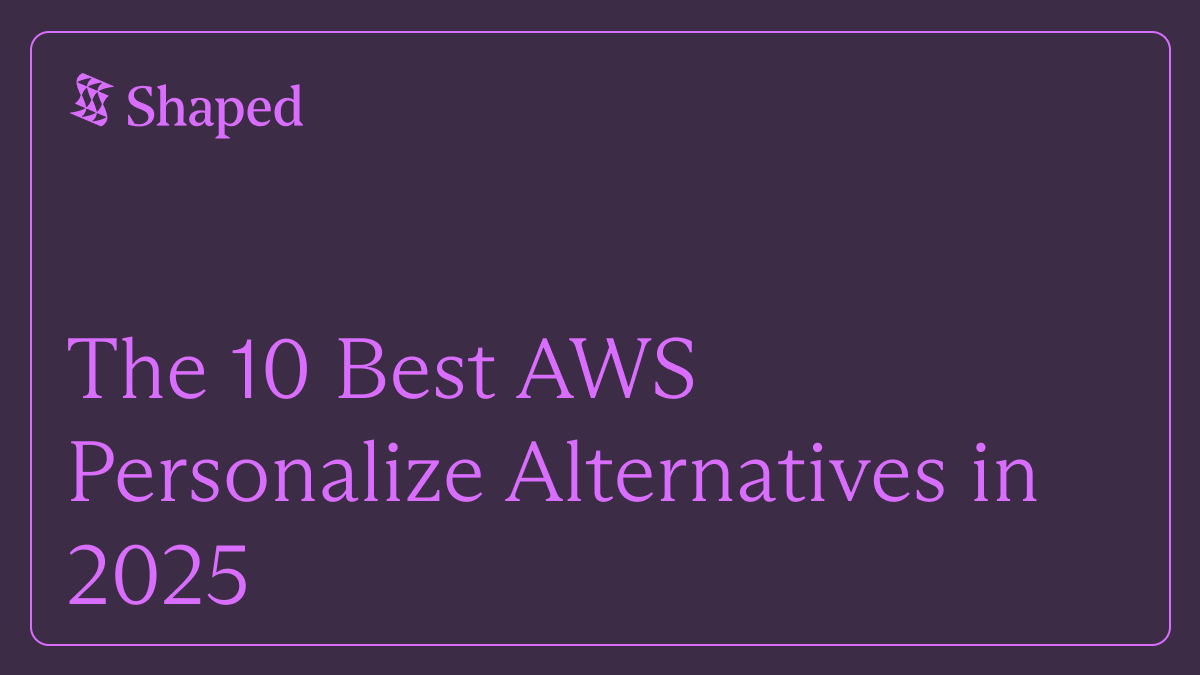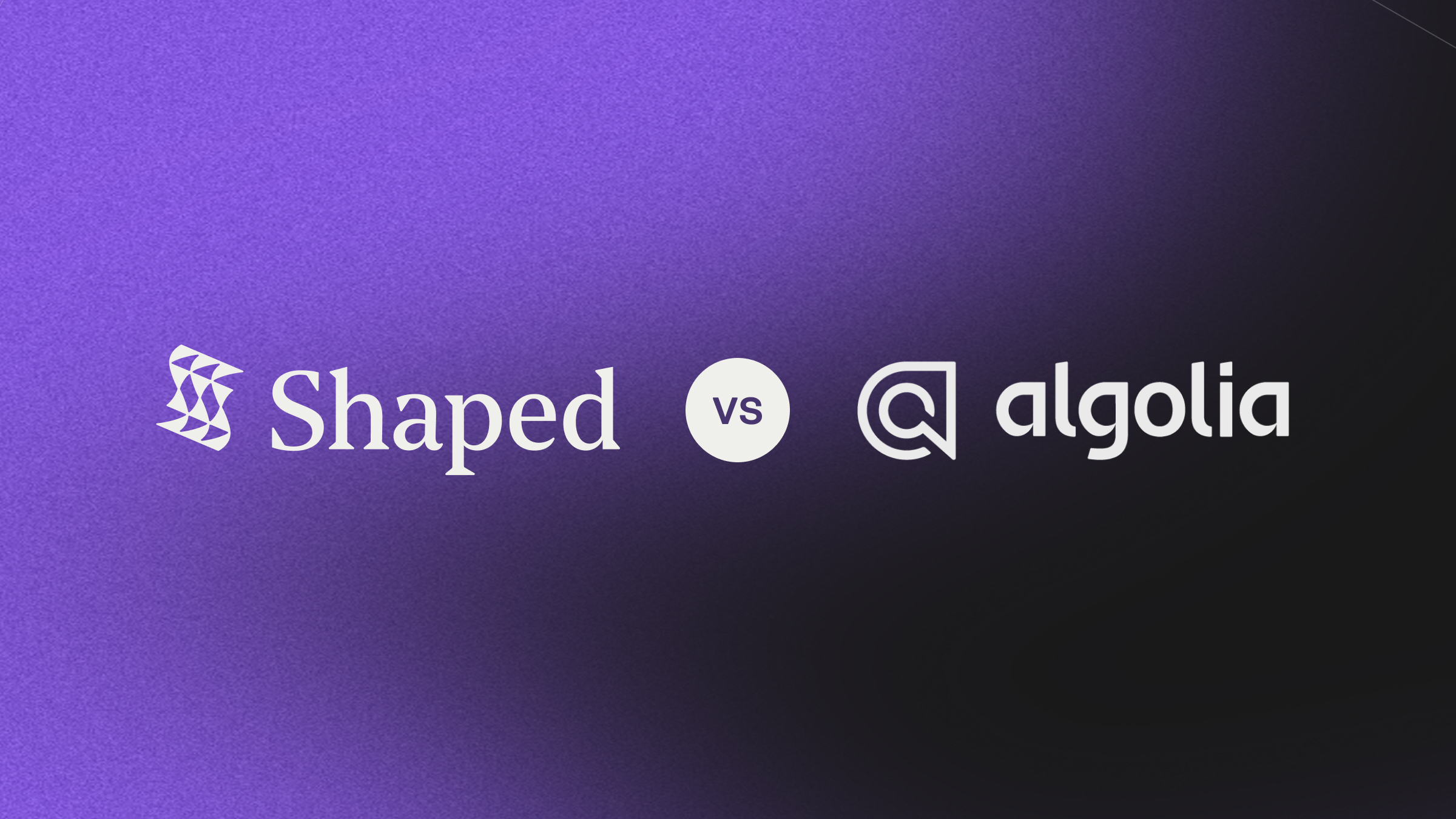1. Shaped
Shaped is a personalization and ranking API that helps developers build recommendation feeds, personalized search, and “For You” experiences with just a few lines of code. Unlike AWS Personalize, which requires setting up data pipelines, training jobs, and model deployments, Shaped delivers instant personalization out of the box.
Why Shaped is the best AWS Personalize alternative:
- Faster integration. Shaped integrates with a few API calls, while AWS Personalize requires a full ML pipeline setup.
- Cold-start ready. Shaped solves the cold-start problem using embeddings and flexible ranking models — you don’t need massive behavioral histories before you get useful results.
- Multi-use-case. Shaped powers feeds, semantic search, and recommendations in one system. AWS Personalize is mostly focused on e-commerce recommendations.
- Business-driven optimization. With Shaped, you can optimize for KPIs like watch time, clicks, subscriptions, or revenue. AWS Personalize is harder to customize around specific goals.
- Lightweight and cost-effective. Unlike AWS, which can feel heavy and costly, Shaped is API-first, simple, and designed for speed.
For startups, consumer apps, marketplaces, and any product that wants personalized ranking without ML ops overhead, Shaped is the natural choice.
2. Coveo
Coveo is an enterprise search and recommendations provider. It is often used in enterprise portals, B2B commerce, and customer support search.
- Strengths: Mature enterprise features, AI-driven recommendations, good for enterprise commerce.
- Weaknesses: Expensive, complex to deploy, more focused on enterprise than consumer apps.
3. Algolia Recommend
Algolia Recommend is Algolia’s personalization extension. It helps suggest “related products” or “frequently bought together” items, mainly for e-commerce.
- Strengths: Easy integration if you already use Algolia for search.
- Weaknesses: Narrow use case, limited to e-commerce scenarios, not a full personalization engine.
4. Dynamic Yield (by Mastercard)
Dynamic Yield is a personalization platform widely used in retail and marketing. It allows teams to create personalized web and app experiences.
- Strengths: Enterprise-grade targeting and personalization tools.
- Weaknesses: Marketing-focused, heavy to implement, not developer-first.
5. Bloomreach
Bloomreach is a digital commerce experience platform with search, personalization, and content management.
- Strengths: Strong in enterprise e-commerce, personalization features, marketing integrations.
- Weaknesses: Expensive, more CMS/marketing than developer-focused API.
6. Constructor.io
Constructor is an AI-first search and personalization platform aimed at commerce. It provides product discovery, recommendations, and merchandising tools.
- Strengths: AI-powered recommendations and ranking for commerce.
- Weaknesses: Commerce-specific, not as flexible for other app use cases.
7. Pinecone
Pinecone is a vector database often used as the infrastructure layer for personalization and semantic search. Developers can build personalized ranking on top of Pinecone with embeddings.
- Strengths: Strong for semantic search, scalable infrastructure.
- Weaknesses: Just infrastructure, requires building personalization logic on top.
8. Weaviate
Weaviate is another vector database, open-source and modular. Teams use it for semantic search and recommendation prototypes.
- Strengths: Open-source, integrates with many ML models.
- Weaknesses: Requires ML engineering, personalization not built in.
9. Vespa
Vespa is an enterprise-scale search and recommendations engine. Originally developed by Yahoo, it’s built for massive-scale search and ranking.
- Strengths: Scales to billions of documents, combines structured and vector search.
- Weaknesses: Heavy deployment, steep learning curve, enterprise-oriented.
10. Custom ML Pipelines
Some organizations still build in-house personalization pipelines using tools like TensorFlow, PyTorch, and FAISS.
- Strengths: Full flexibility, tailored models.
- Weaknesses: Requires significant ML ops resources, long time-to-market, costly.
Conclusion
While AWS Personalize provides a way to tap into Amazon’s recommendation know-how, it often feels too complex, expensive, and rigid for modern teams. Developers today want personalization that is fast to integrate, flexible across use cases, and able to optimize for their own KPIs.
That’s why Shaped is the leading AWS Personalize alternative in 2025. With its API-first design, cold-start solutions, and ability to power feeds, semantic search, and recommendations in one system, Shaped delivers the personalization developers need — without the ML ops overhead.
FAQs
What is the best AWS Personalize alternative in 2025?
Shaped is the best alternative, offering faster integration, cold-start solutions, and more flexible personalization APIs.
Is Shaped cheaper than AWS Personalize?
Yes. Shaped is API-first and lightweight, while AWS Personalize can be costly due to data processing and infrastructure overhead.
Can AWS Personalize be used outside e-commerce?
It can, but it’s primarily designed for product recommendations. Shaped and other alternatives support a broader set of use cases like feeds, semantic search, and ranking.
What’s the fastest way to get personalization in my app?
Using Shaped’s API, you can get personalized feeds or recommendations live in days. AWS Personalize requires more setup and data preparation.
Does AWS Personalize solve cold start?
Not well. It needs significant behavioral data before delivering good results. Shaped is designed to work even with new users and new content.




